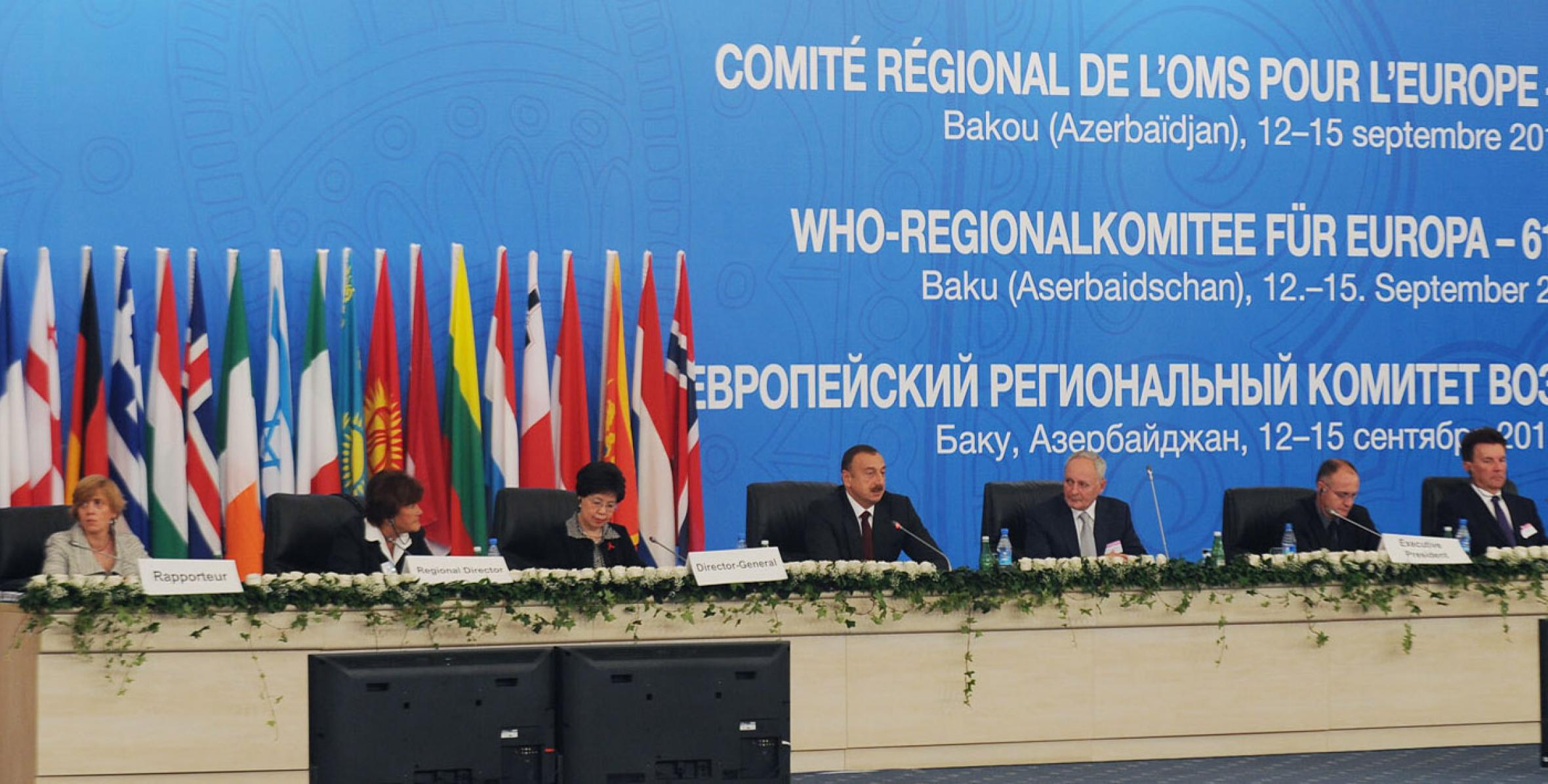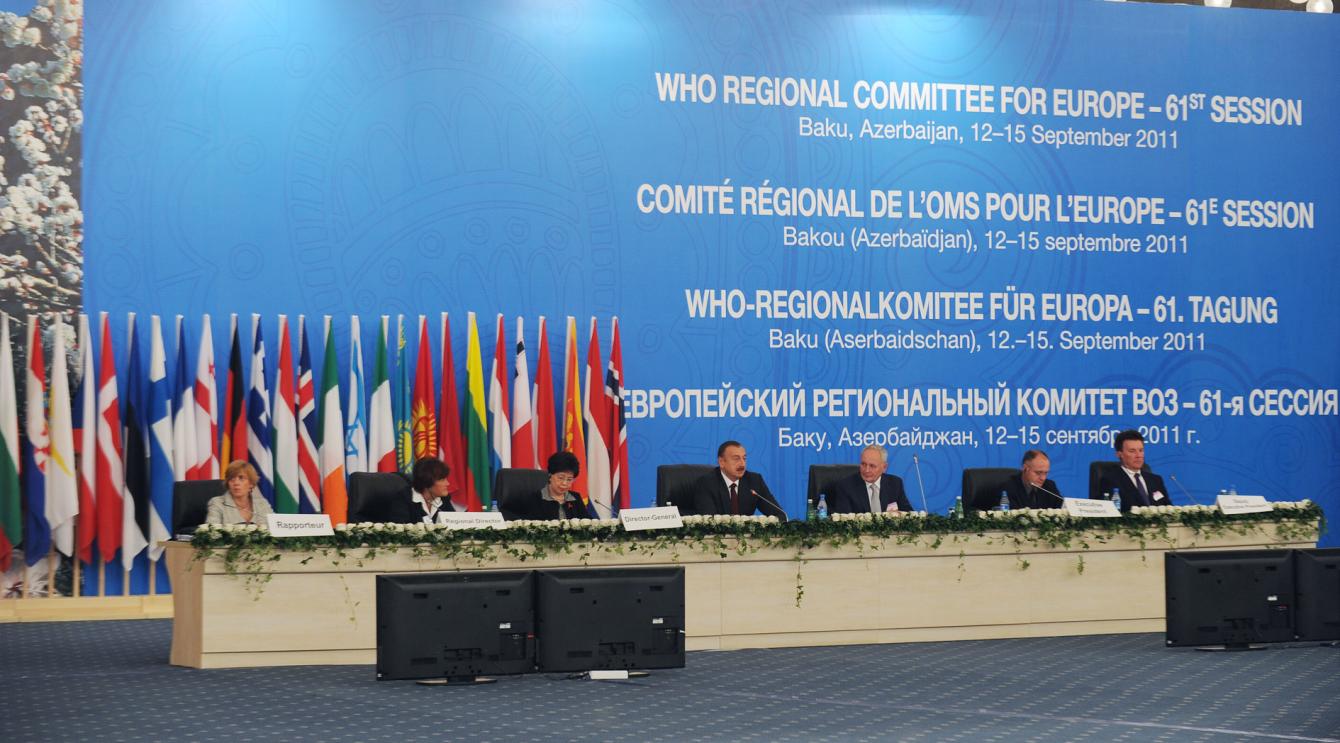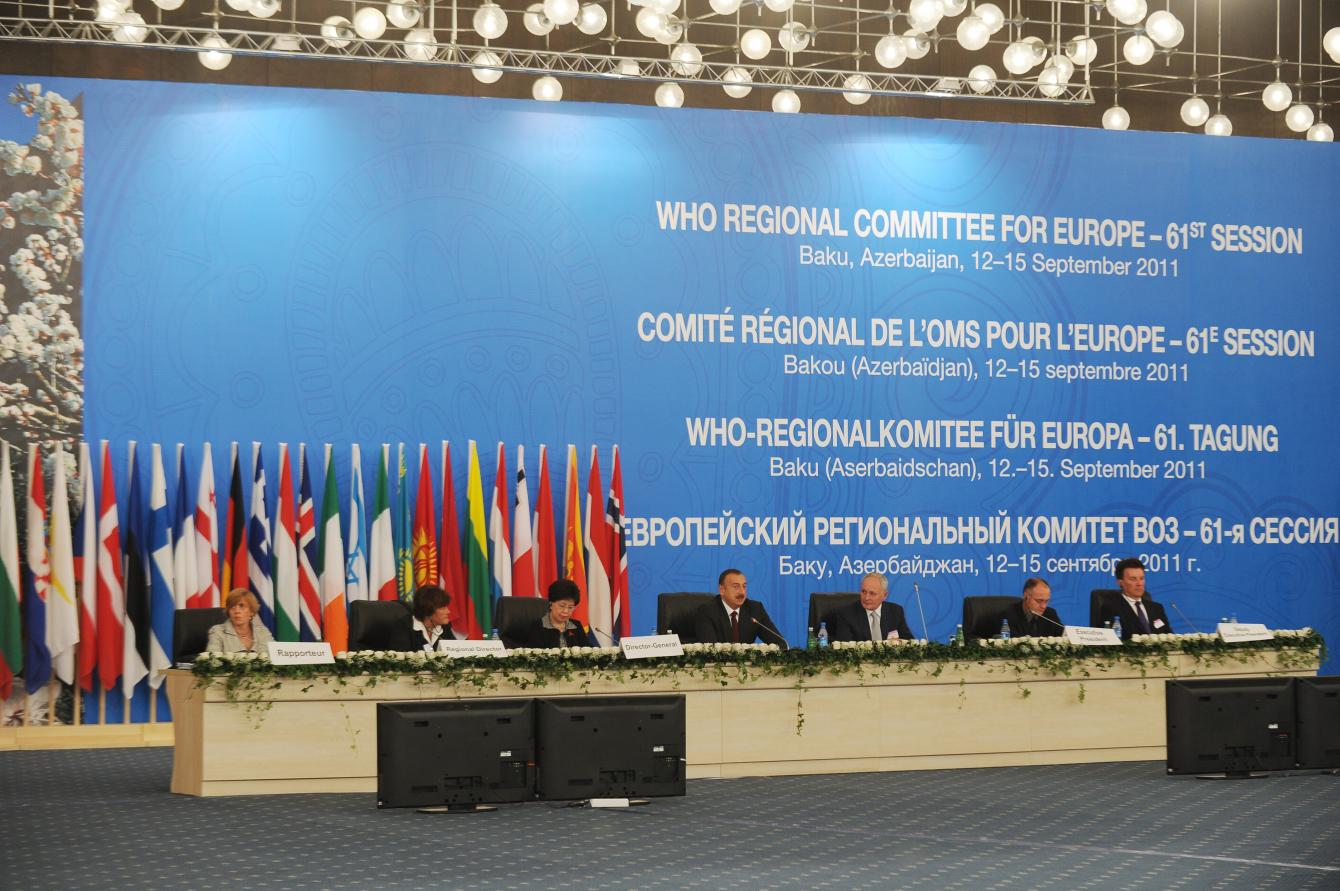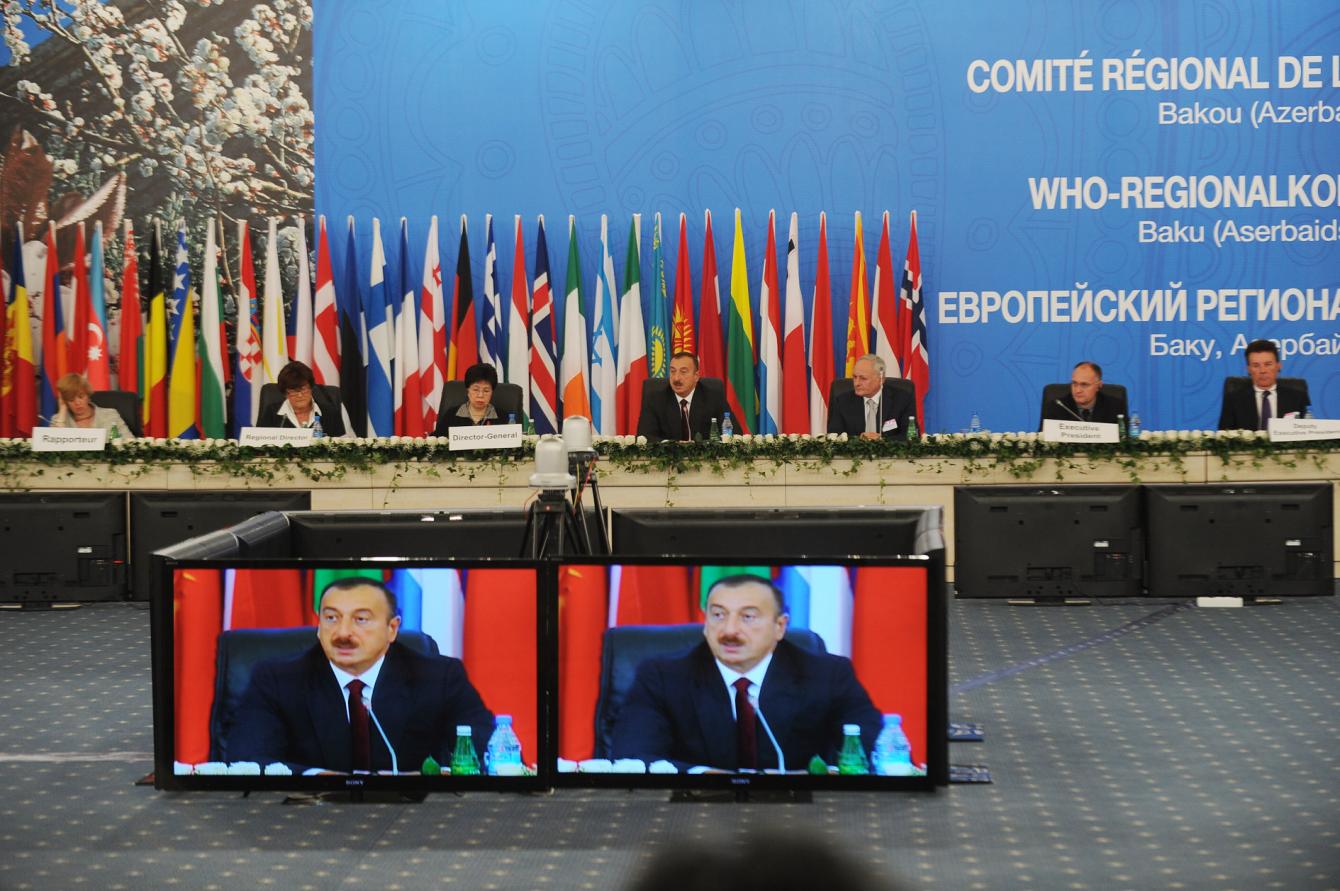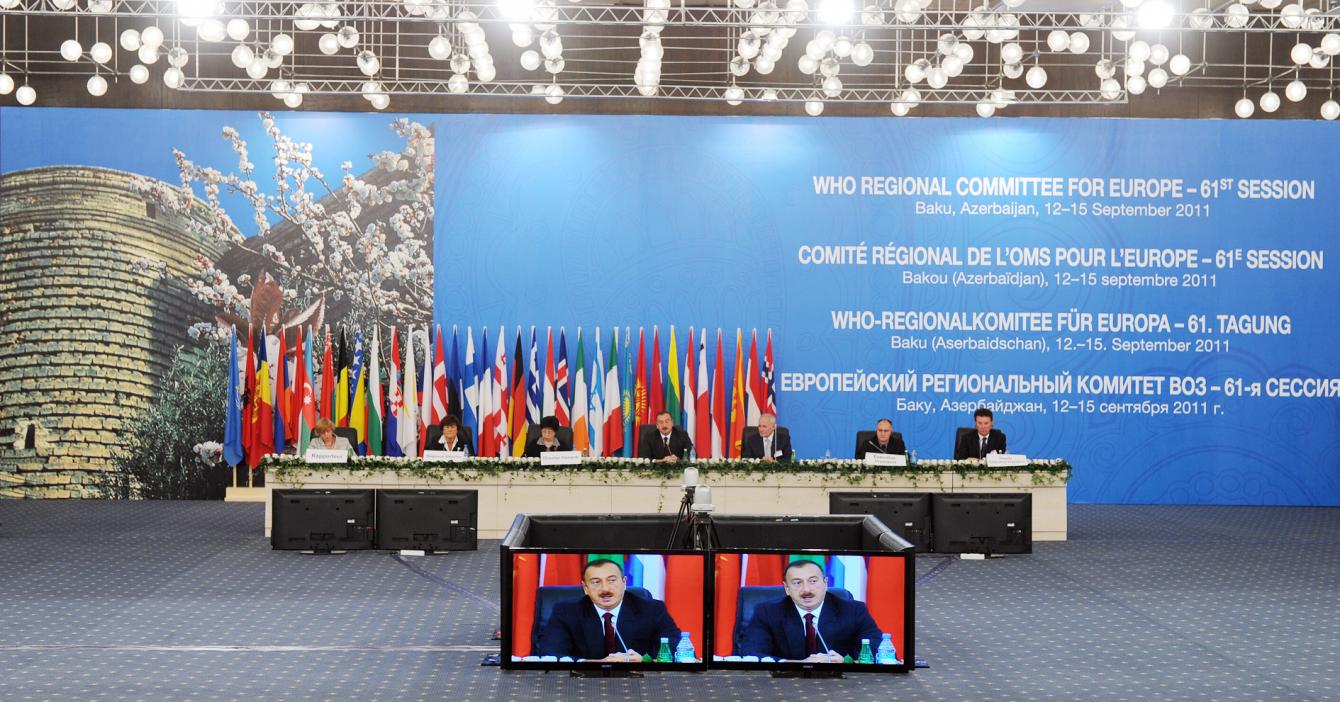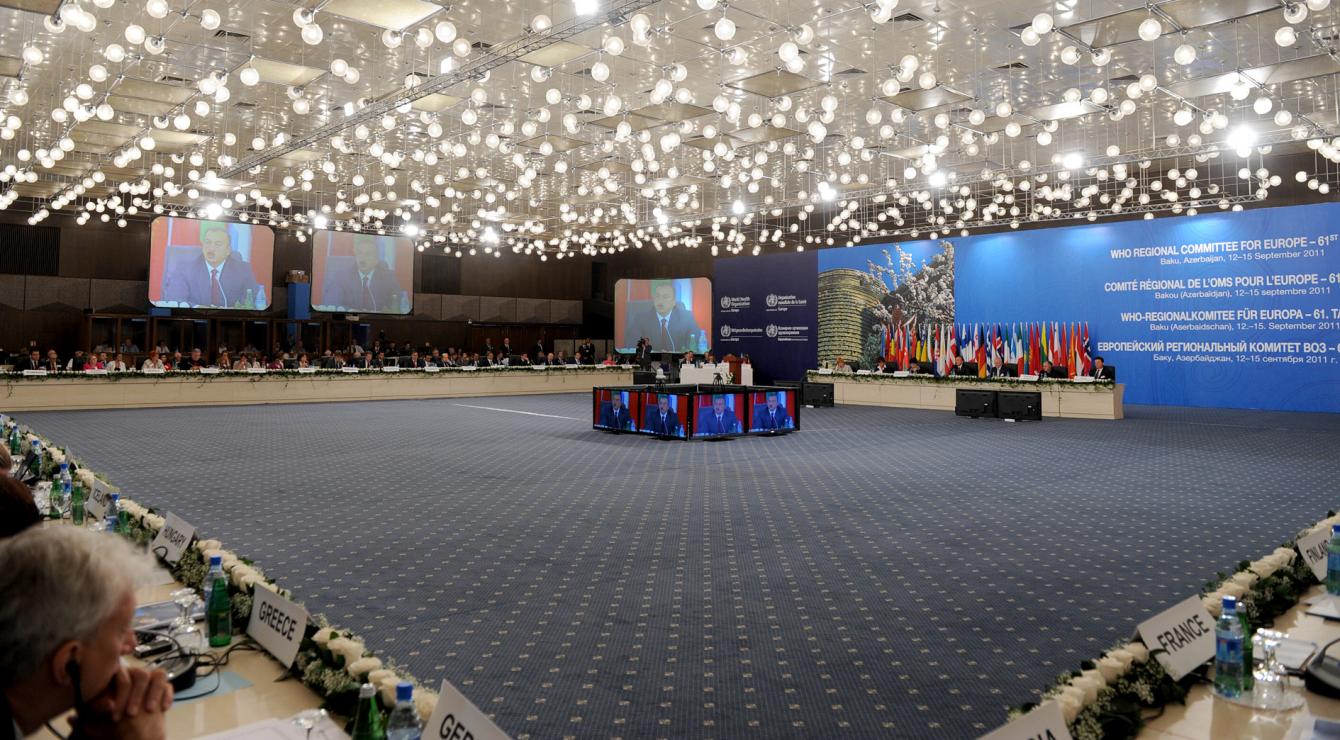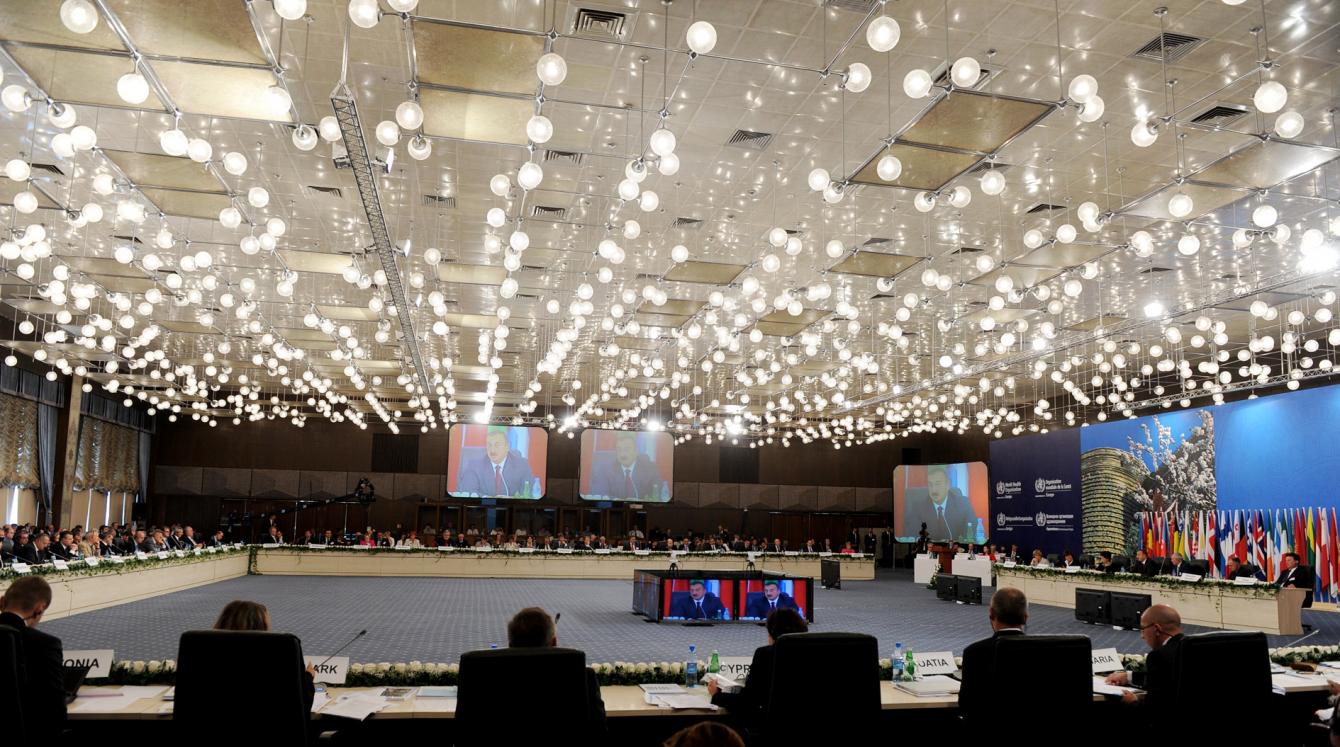The 61st session of the World Health Organization (WHO) Regional Office for Europe commenced at the “Gulustan” Palace in Baku.
President of Azerbaijan Ilham Aliyev attended the opening session.
The event is attended by Director General of the WHO Margaret Chan, health ministers of 53 countries, the heads of several reputable international organizations and Azerbaijani health specialists.
The fact that the session is held in Azerbaijan is no coincidence. Our country has carried out important healthcare reforms of late. Officials representing many international bodies, including the Regional Committee for Europe of the World Health Organization, are noting that Azerbaijan has made great strides in the health sector, while many European countries can benefit from Azerbaijan’s experience in this sphere.
The amount of budget allocations for the development of healthcare in the country is increasing, new modern health facilities are built and existing hospitals reconstructed. In addition to the state support and care, the Heydar Aliyev Foundation has also identified the development of healthcare as a priority of its activities. Family, maternal and child care are among the key activity areas of the Foundation. The necessary programs and projects undertaken in this regard on the initiative of the President of the Foundation, Mrs. Mehriban Aliyeva, have made an invaluable contribution to the development of Azerbaijan’s healthcare.
The session participants warmly welcomed the Azerbaijani President.
President Ilham Aliyev addressed the ceremony.
Remarks by Azerbaijani President Ilham Aliyev
- Dear ladies and gentlemen!
Dear guests! Distinguished general director!
Let me salute you all and welcome to our country! The fact that a session of the Regional Committee for Europe of the World Health Organization is being held in Azerbaijan is a very important and significant event for our country. I am very pleased that representatives of the European continent are our guests today. I am sure that the session will be successful. At the same time, guests will see our country and city.
We are very pleased that the collaboration between the World Health Organization and Azerbaijan is developing very successfully and rapidly. The Organization’s recommendations and advice are very valuable for us and for the healthcare reforms under way in Azerbaijan. I want to specifically welcome the general director of the World Health Organization, Mrs. Margaret Chan. Mrs. Chan is our friend, a friend of our country. This is not her first visit to Azerbaijan. Every time she is in Azerbaijan to hold discussions we see that the World Health Organization is led a very decent person. The general director has made a lot of effort to promote the authority of the organization in recent years.
Healthcare issues receive great attention in Azerbaijan. Information on the subject will probably be provided in the course of today’s discussions. I can say that our state and government are paying a lot of attention to social issues. Suffice it to provide a few figures to see that our policy in this area is indeed very precise and positive. Over the past five years our budget allocations for health issues have increased more than eight times. This in itself shows that it is our priority. Our state is committed to making every effort to ensure the health of its citizens. In recent years we have taken specific steps to strengthen the material and technical infrastructure of the healthcare system. Because, as you know, the economic situation in Azerbaijan in the early years of independence was very difficult, there was crisis, our financial resources were very limited, while the health facilities established in previous years had become dilapidated. We wanted very much to achieve a breakthrough in the shortest possible time. The health facilities built and reconstructed in Azerbaijan over the past few years reflect the realities of the present-day Azerbaijan. Over 400 health facilities have been built or renovated in Azerbaijan in recent years. Among these I would like to point to the Cancer Center established in Baku in recent years, which is of particular importance. At the same time, very modern Ophthalmological Center, the Urology Center, the Thalassemia Center, the Scientific Surgical Center have been built. Perinatal centers are being set up in our country. Hospitals are built and renovated in practically all our cities. Treatment and diagnostic centers meeting the latest standards and operating hemodialysis facilities have been built in 14 cities. I want to emphasize that public health facilities provide services free of charge.
At the same time, we have spent significant resources in recent years to purchase modern equipment. I believe that the positive dynamics observed in the healthcare system has been possible thanks to the strengthening of the material and technical infrastructure.
At the same time, the ongoing healthcare reforms, the application of the most advanced practices in Azerbaijan, the international relations, the attention being paid to the professional development of our doctors, the training of Azerbaijani doctors in foreign clinics – I think all of these issues have brought about a dramatic turn in the healthcare system. And, of course, the result of this work is people’s health. The positive dynamics in this sphere shows that life expectancy has increased, while infant and maternal mortality have dropped in recent years. We must preserve this positive momentum so that all the health issues planned for the future are resolved. We have many plans. Currently, new and modern health facilities are under construction in several our cities, including Baku. I can say that thanks to them the material and technical infrastructure of Azerbaijan’s healthcare system will be fully renewed.
Along with this, we in Azerbaijan are paying great attention to other issues that contribute to human health. First of all, our country has taken specific steps to improve the environmental situation. You know perfectly well that the environment can have great influence on human health – both positive and negative. Last year was announced the Year of the Environment in Azerbaijan. Major steps have been taken. Over 10 million trees were planted in our country in the course of 18 months. The improving environmental situation has a direct impact on human health. Currently, major water-supply projects are under way throughout our country. Unfortunately, the problem of water has always been very acute in Azerbaijan. To resolve this problem, we are taking specific steps, and by 2013 the water supplied to our population should meet the World Health Organization’s requirements. This a criterion, and we will strive to achieve these goals.
These projects require significant resources. But the Azerbaijani government is allocating these funds. At the same time, international organizations have also helped us with loans. I am absolutely sure that thanks to the drinking water and sanitation projects, these factors will also have a very positive impact on human health.
One of the factors contributing to human health is sport. Azerbaijan is doing a lot in this area. More than 30 Olympic sports centers and sports grounds have been built in our country in recent years. In general, our country has excellent conditions for doing sports and physical training. By attracting young people to sports, we pursue several goals. First of all, they become healthier. Besides, we must keep the youth away from bad habits. Azerbaijan has a rigorous campaign against drug addiction. The State Program “Azerbaijani youth in 2011-2015” has recently been adopted. Healthy young people will help reduce health problems in the future. People should look after their health from their childhood, from adolescence.
In my speeches on health issues I always stress that everyone should undergo medical checkups once a year.
Unfortunately, we did not have such practices in the past. I believe that along with all the work in this area we also need to significantly improve awareness activities. People should know that if they undergo checkups at least once a year, it will be easier to identify the disease. If we consider that there are possibilities for the treatment of any disease in Azerbaijan, the disease can be quickly treated. Of course, the experience of the World Health Organization in this issue is very valuable and important to us. The experience of the Regional Committee for Europe is also very important, because Azerbaijan is generally very closely connected to Europe. A number of programs are being implemented. Our relations with the European Union are expanding. Azerbaijan is a member of the Eastern Partnership program. The main reason for our accession to this program is that Azerbaijan wants to apply the best practices of European countries, get closer to European standards and bring the situation in any area into line with European standards. Therefore, the debate on these issues during this session is very important to us.
In addition to resolving social issues, our country is conducting profound economic reforms. If these economic reforms had failed, then most likely it would be difficult to deal with the issues I have identified. In recent years, Azerbaijan has achieved great successes in the economic sphere. Over the past seven years our economy has grown at the highest rate in the world. Over the past seven years our gross domestic product rose almost three-fold, or by nearly 300 per cent. This is a unique indicator worldwide. Along with this, the problem of poverty inherent in our country in the past is being eliminated. In the past seven years the percentage of those living in poverty has dropped from 49 to nine per cent. This too, I believe, is the best development indicator in the world. Of course, the opportunities of someone emerging from poverty are expanding, the financial well-being is improving, and these people can take a good care of their health.
The destitute families are receiving state support in Azerbaijan. A total of 125,000 families living in poor conditions are receiving targeted social assistance from the state. Despite the global financial and economic crisis, not a single social program has been amended in Azerbaijan. There have been no cases of lagging behind or delays. On the contrary, pensions in Azerbaijan have been raised by an average of 40 per cent this year. For a generation of the elderly people this is a direct contribution to their health. Because unfortunately the elderly spend a lot of money on medicines. The health of the elderly certainly requires even more attention. We believe that the increase of pensions by 40 per cent is a solution to a very serious social problem and direct support for human health.
In short, dear friends, the social and economic reforms of recent years have produced positive results in our country. Along with this, of course, the country faces problems. We must strive and aspire to resolve them. Our economic course is correct. I am fully confident that the economy of Azerbaijan will continue to thrive. As for social issues, we have serious and specific state programs on each social issue, and these programs are being implemented. International organizations are giving their assessment of the work carried out in Azerbaijan. Azerbaijan is a country that has achieved the greatest progress worldwide in terms of the human development index over the past five years. According to the World Economic Forum, Azerbaijan is ranked 55th in the world for the competitiveness of its economy. It is third among former Soviet republics and first in the CIS. These figures, of course, are very inspiring for us. Let me repeat – they suggest that we have chosen the right course. Therefore, the attention shown to Azerbaijan by international organizations, especially such an influential and respected organization as the World Health Organization, is very valuable and important to us.
Dear friends, let me warmly welcome you all to Azerbaijan again! I wish you and the session further successes!
Thank you!
Х Х Х
Azerbaijani Health Minister Ogtay Shiraliyev thanked President Ilham Aliyev for attending the opening ceremony and supporting the session.
Х Х Х
Then the head of state met foreign participants of the session and wished them and the session further successes.
X Х Х
The session was then continued. Azerbaijani Health Minister Ogtay Shiraliyev was elected chairman of the 61st session.
In his remarks, Ogtay Shiraliyev said that a new strategy of the Regional Committee for Europe of the World Health Organization would be determined during the Baku session. The minister spoke about the effective results of integration of Azerbaijan’s healthcare system into international health organizations. Mr. Shiraliyev noted that the documents to be adopted in Baku could play the role of a roadmap for health workers responsible for the lives and health of millions of people around the world.
Then the session agenda was approved.
Health Minister Ogtay Shiraliyev read out a message of congratulation on behalf of Azerbaijan’s First Lady, President of the Heydar Aliyev Foundation, the Goodwill Ambassador of UNESCO and ISESCO, MP Mehriban Aliyeva to the session participants. The message says:
“Distinguished guests!
Let me cordially welcome you all to the Azerbaijani capital, the city of Baku, and wish each one of you a long life, good health and success. I do hope that the work of the session being conducted in our country will result in the adoption of documents crucial to public health and have a positive impact on the development of a new European healthcare policy in the 21st century.
This session of the Regional Committee overlaps in time with the 20th anniversary of the restoration of state independence in Azerbaijan. In the past years, Azerbaijan’s healthcare system, having covered a long road, has made great strides. The country has thoroughly upgraded the material and technical infrastructure of medical institutions, established new health facilities meeting contemporary requirements and private sector institutions.
Within the framework of various effective government programs, considerable work has been done to address infectious diseases, diabetes, hemophilia and other problems associated with human health. I do hope that familiarization with our healthcare system will create a solid foundation for our future cooperation.
In this globalizing world, the attachment of many health determinants to economic and social development, while presenting us with new challenges, requires the formation of a new strategy for cooperation among government agencies, private sector and civil society. Therefore, the Foundation I am leading has been implementing large-scale healthcare projects since it was created. Our strong collaboration with the world’s leading healthcare companies and humanitarian foundations is paying off.
I am confident that the consistent policy of the World Health Organization towards achieving third millennium development goals will continue to serve the interests of mobilization of the existing capacities of our countries and healthcare development through various means, including the successful work of the Regional Committee.
With best wishes,
Mehriban Aliyeva
President of the Heydar Aliyev Foundation”
Х Х Х
The director of the WHO Regional Office for Europe, Zsuzsanna Jakab, delivered a report a the session.
Indicating that life expectancy in Europe has increased in the last 20 years, Jacob also pointed to some problems in the healthcare system.
Stressing the importance of a more serious approach to preventive healthcare, Z. Jakab said the Baku session would discuss strategies and plans of European countries associated with the current health issues at the national and regional levels. It was noted that the documents to be accepted at the session envisage expansion of cooperation among European countries to implement the “Health 2020” program.
Z. Jakab noted that some healthcare problems have already been partially resolved and stressed the importance of the fact that institutions of all countries, especially those of the health sector, show the necessary reaction during emergency situations. She also commented on the activities of the World Health Organization and its Regional Office in emergency situations.
Speaking about the experience of countries in the prevention of some infectious diseases, the director of the WHO Regional Office said, “The 52 member-countries have very successfully held the European Immunization Week. Such events provide a major impetus to our activities. I would like to highlight the achievements of Azerbaijan in this area.”
At the same time, Z. Jakab also said that Azerbaijan has also taken very effective measures to combat malaria.
Drawing attention to the complications of tuberculosis, AIDS and antibiotics, Zsuzsanna Jakab stressed the importance of joint efforts to enhance ways of combating these diseases.
Noting that environmental and health issues are also in the focus of the Regional Committee for Europe of the World Health Organization, Z. Jakab said a wide range of programs dealing with the negative and positive environmental impacts on human health were being implemented. She provided detailed information about ongoing health projects.
Then discussions of the report were held. Representatives of the Health Ministries of Kazakhstan, Bosnia and Herzegovina, Poland, Norway, Russia, France, Switzerland and other countries talked about the fight against non-communicable diseases, tuberculosis and AIDS, resistance to alcoholism and antibiotics, as well as reforms in the World Health Organization.
Speaking at the session, the First Lady of Georgia, Sandra Elizabeth Roelofs, said that Azerbaijani healthcare has been growing rapidly in recent years and pointed to the importance of the Baku session in terms of efficiency of the fight against the most common diseases in the European region.
In his remarks, the director of the Global Fund for HIV/AIDS, Tuberculosis and Malaria, Michel Kazatchkine, thanked the Azerbaijani government for the good organization of the event. He noted that the European action plan on HIV/AIDS for 2012-2015 serves to prevent the disease. Globally, the number of people infected with the disease is reducing. However, the number of HIV-infected in Eastern Europe and Central Asia has tripled since 2000. The focus should be on preventing re-infection and providing better care to patients of this category. A new study published this summer points to the efficiency of treatment methodology as prophylaxis. This methodology will help reduce re-infection in half by 2015.
A document on cooperation between the Global Fund and the WHO was signed at the session. It was signed by Michel Kazatchkine and Zsuzsanna Jakab.
Then the session listened to a report of the standing commission of the Regional Committee for Europe of the WHO. The report provides information on the work carried out by WHO committees and member-organizations, as well as upcoming projects.
The first day of the session continued with discussions on the objectives and main directions of the “Health 2020” program.
Representatives of countries attending the 61st session of the Regional Committee for Europe of the World Health Organization pointed to a good organization of the event.
The session will be continued on 13 September.

